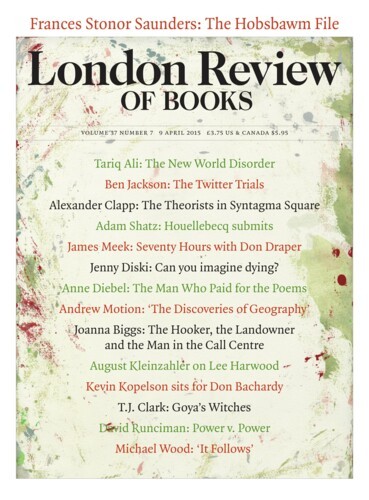In The Orchid Boat, the most recent of his more than 25 collections, Lee Harwood lights out from his seaside eyrie in Hove to many places, real, dreamed of or imagined: New Zealand, north-east India (‘where the Khasi people still sing some/hymns in Welsh’), fourth-century Alexandria, the Royal Botanic Gardens at Kew, 15th-century Constantinople, Bologna in 1992, Amiens during the First World War, the T’ien-t’ai Mountains in China, the Rhinog mountains in Snowdonia, the beach at Harlech. The 16 poems in the book cover as much subject matter as territory: the murder of the mathematician Hypatia (‘Bishop Cyril, may you be tormented for ever’); Harwood’s father as a young officer in 1940, ‘having to shoot one of his own men,/his stomach ripped open beyond saving,/begging to be put out of his agony’; a Polish table set for guests with ‘fresh baked makaroniki’; Harwood’s great-great-aunt Leah Lee, who wound up marrying Jules Laforgue; the poet imagining himself as an ‘old frog’ surfacing from a pond’s muddy bottom, his ‘orange eyes bright with expectation’; a serpentine and oblique meditation on war and the children of war conducted while listening to a recording of the Greek bouzouki player Vassilis Tsitsanis singing ‘Cloudy Sunday’, written in Athens during the Second World War; and yet another in a series of remembrances for the poet Paul Evans, who died in an accident while climbing with Harwood many years ago, in which Harwood places a stone in on a summit cairn ‘as ravens glide by, two buzzards circle,/and a flock of goats clatters across the scree below.’
The title of the book is to be found in the collection’s first poem, ‘Departures’, which itself quotes from ‘Sorrows of Departure’ by the 12th-century Chinese poet Li Ch’ing Chao:
A hot summer night,
the sound of rain in the courtyard.
A satin breeze sways the curtains.She wrote
‘Gently I open
my silk dress and float alone
on the orchid boat. Who can take a letter beyond the clouds?’
Then the poet (perhaps: pronouns are often ambiguous in Harwood’s work) replies:
And he wrote
‘A picture held us captive and we
could not get outside it.’
Further on in the poem:
The letter will reach the other side of the mountains,
clouds will roll back clear of the summits.
What was needed was done, but never done,
it’s never done.
The poem appears to be about lost love: this is a persistent motif in Harwood’s poetry over five decades, just as a mountain landscape, real or figurative, is a familiar setting.
Harwood’s poems are carried across many horizons by his lightness of touch: it’s like the lightness of the hollow bones in a bird’s skeleton, which are nevertheless substantial enough to carry it long distances. Harwood zooms in and out, from the intimate and immediate to more distantly viewed landscapes and panoramas involving dream, memory, historical incident, all of which freely, and somehow effortlessly, intermingle. His poetry, Iain Sinclair once suggested, resembles ‘floating translucent landscape (much of it out there underwater, a distance we can’t quite reach)’.
Harwood’s influences have by now been so thoroughly assimilated that on first encountering the poetry one might be hard put to identify them. The elements of collage and surrealism suggest late 19th and early 20th-century French poetry. The frequently shifting points of view – pans, zooms, fades, jump-cuts and the rest – are cinematic. The plainness of diction and spare style was acquired, at least in part, from William Carlos Williams, an early enthusiasm, with his habit of detailed observation and fascination with the ordinary or non-poetic: what Williams himself called the ‘imaginative qualities of the actual things’. From Ashbery, to whom Harwood was close in the 1960s as a very young poet, he would have picked up a great deal, notably an instability of tone and point of view, a habit of using interchangeable pronouns and a general sense of playfulness: the use of feints, unexpected transitions and shifts in register that wrongfoot the reader. Ashbery is funnier, more the dazzling virtuoso than Harwood, or any other contemporary; Harwood seems to value plainness of expression, no matter how startling the transitions, over virtuosity. His humour, such as it is, is more like a bewilderment at some curious turn or disclosure, as if he, with the reader, is astonished by what has just transpired in his poem.
As for the sound and movement of his work, almost none of the musical elements we associate with poetry is present: there is no chiming of vowels and consonants, no sound patterning, metrical rhythm and the rest. His lines seem to be units of thought or phrase. The sound or voice resides somewhere between interior conversation and the sort of discussion we might conduct with another person in our own head. Even without the traditional musical resources of verse the lines seem to feed into one another and to make sense structurally as the poem develops:
The worn book advises small steps
and a slow care. Nothing too fancy.
Some form of change ahead, it says.
A silence on the hillside. All this whiteness.
A stillness in which time has ceased, or seems so.As the mist shifts you see swallows set on a wire,
a wagtail bobbing on a rock.
(‘Ornithology’)
And there’s no mistaking the very definite closure at the end of a poem:
Here comes Mrs Trilobite, fresh from the shale.
She’ll shake the nonsense out of us.
One wonders, more often than not, how one got to this point, but there lies Harwood’s considerable art.
Send Letters To:
The Editor
London Review of Books,
28 Little Russell Street
London, WC1A 2HN
letters@lrb.co.uk
Please include name, address, and a telephone number.

